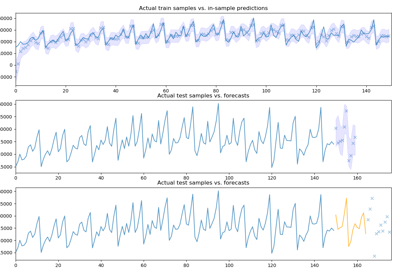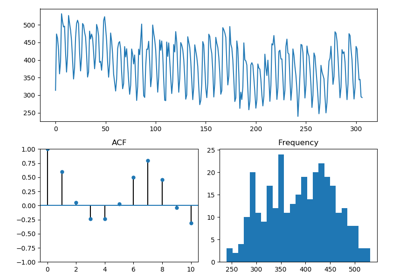pmdarima.pipeline.Pipeline
- class pmdarima.pipeline.Pipeline(steps)[source][source]
A pipeline of transformers with an optional final estimator stage
The pipeline object chains together an arbitrary number of named, ordered transformations, passing the output from one as the input to the next. As the last stage, an
ARIMAorAutoARIMAobject will be fit. This pipeline takes after the scikit-learnsklearn.Pipelineobject, which behaves similarly but does not share the same time-series interface thatpmdarimafollows.The purpose of the pipeline is to assemble several steps that can be cross-validated together while setting different parameters. For this, it enables setting parameters of the various steps using their names and the parameter name separated by a ‘__’, as in the example below.
- Parameters:
- stepslist
List of (name, transform) tuples (implementing fit/transform) that are chained, in the order in which they are chained, with the last object an ARIMA or AutoARIMA estimator.
- Attributes:
named_stepsMap the steps to a dictionary
Examples
>>> from pmdarima.datasets import load_wineind >>> from pmdarima.arima import AutoARIMA >>> from pmdarima.pipeline import Pipeline >>> from pmdarima.preprocessing import FourierFeaturizer >>> >>> wineind = load_wineind() >>> pipeline = Pipeline([ ... ("fourier", FourierFeaturizer(m=12, k=3)), ... ("arima", AutoARIMA(seasonal=False, stepwise=True, ... suppress_warnings=True, ... error_action='ignore')) ... ]) >>> pipeline.fit(wineind) Pipeline(steps=[('fourier', FourierFeaturizer(k=3, m=12)), ('arima', AutoARIMA(D=None, alpha=0.05, callback=None, d=None, disp=0, error_action='ignore', information_criterion='aic', m=1, max_D=1, max_P=2, max_Q=2, max_d=2, max_order=10, max_p=5, max_q=5, maxiter=None, method=None, n_fits=10, n...s_warnings=True, test='kpss', trace=False, transparams=True, trend=None, with_intercept=True))])
Methods
fit(y[, X])Fit the pipeline of transformers and the ARIMA model
get_metadata_routing()Get metadata routing of this object.
get_params([deep])Get parameters for this estimator.
predict([n_periods, X, return_conf_int, ...])Forecast future (transformed) values
predict_in_sample([X, start, end, dynamic, ...])Generate in-sample predictions from the fit pipeline.
set_params(**params)Set the parameters of this estimator.
set_predict_request(*[, alpha, ...])Configure whether metadata should be requested to be passed to the
predictmethod.set_transform_request(*[, n_periods])Configure whether metadata should be requested to be passed to the
transformmethod.summary()Get a summary of the ARIMA model
transform([n_periods, X])Get the transformed X array
update(y[, X, maxiter])Update an ARIMA or auto-ARIMA as well as any necessary transformers

